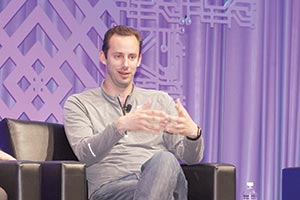Otto Co-Founder Plans to Overhaul Industry, Beginning With Launch of Uber Freight

This story appears in the Oct. 10 print edition of Transport Topics.
LAS VEGAS — A self-professed lover of robots, Anthony Levandowski has examined the trucking industry and found it wanting.
So he and three others co- founded Otto, a provider of self- driving vehicle technology and services, in January. By August, he had sold it to Uber for $680 million.
Levandowski, whose company is developing aftermarket self- driving systems, spoke to truckers about pricing efficiency, driving that’s less taxing and improved safety. And, while it may take 20 or 30 years, he said he also sees driverless trucks without cabs.
MCE PHOTO GALLERY: Best pictures from Las Vegas
COMPLETE MCE COVERAGE: Live stories, photos, video, social media and more
“Change is always scary, but people need to understand . . . automation is going to happen,” Levandowski said in an interview after participating in a Transport Topics panel discussion on Oct. 4 at American Trucking Associations’ annual Management Conference & Exhibition here.
Levandowski, 36, said new technology usually makes people’s lives better, even if it causes tumult when introduced. He cited telephone operators and elevator operators as job classifications that have vanished, but society doesn’t miss them now.
He’s a tinkerer. He has invented a self-driving motorcycle that is in the Smithsonian’s National Museum of American History collection. He previously was a Google executive who worked on its self-driving car project and currently heads up Uber’s driverless car work in addition to Otto.
While the technology he wants to put onto trucks to make them self-driving will be pricey at first, he said with time and scale new systems invariably become cheaper.
What could really make driverless trucks affordable is stripping out the need to accommodate people.
“Thirty percent to 40 percent of the cost of a truck is for driver comfort,” he said, adding that “many years from now trucks won’t have a cab.”
He also thinks well-developed automation will be able to operate a truck more safely than a human driver, thereby reducing highway fatalities.
Otto has described trucks as “a marvel of engineering and innovation a century ago [that are] now no longer able to keep up with modern- day demands.”
Levandowski agreed. He described aspects of trucking as being shamefully antique.
“The hours-of-service regulations are confusing, long and don’t make sense — they’re even enforced with paper,” he said during the panel presentation. “It’s 2016, why aren’t shipments automatically connected?”
The pricing established by shipping contracts is inherently flawed, he said. Consider a specific load transported over a given lane. If the economy is growing and the demand for trucking is high, the contract price will be too low and a driver might not bother to show up.
But if the need for trucks is low, the shipper is paying too much money, Levandowski said, adding that the Uber network is ideal for producing an accurate price immediately.
Levandowski said he has talked to drivers, mainly owner-operators, about Uber Freight and said he thinks he can make them three times more productive.
He said while some firms talk of bringing an Uber-like service to trucking, Uber Freight will launch before the end of this year.
“This will give them the tools to drive more,” he said of the new service.
Safety reviews are included in the plans.
“We’ll do a background check,” he said, and monitor insurance certification and driving records. Drivers, he said, could be ranked on a five-star system similar to hotels.
He said Uber Freight follows logically from UberEats for delivering carry-out food and UberRush for last-mile delivery of Wal-Mart purchases.
Levandowski said Freight will start with limited, specific traffic lanes so the system can build density.

